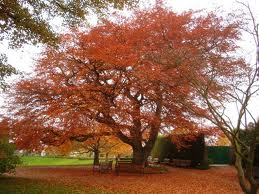52 Short Stories and Poems: Stanley Plumly and Sir Arthur Conan Doyle.
Copper Beech Tree
I was in the library the other day and checked out Now That My Father Lies Beside Me: New and Selected Poems, 1970-2000 by Stanley Plumly. The hardcover was published by in 2000 by Ecco Press, an imprint of Harper Collins. I am always looking for poets and poetry, but I'd never heard of him. I live in Maryland. Stanley Plumly is the Director of Creative Writing at the University of Maryland and the Poet Laureate of Maryland. Plumly was at a library a few miles from where I live two months ago. These are the websites I read to find out about him. Stanley Plumly Anyhow, now I temporarily possess one of his books and have found a few pieces I like and understand.
There's a poem titled "Conan Doyle's Copper Beaches" on page 35 of the softcover that was published in 2001. I read a lot of Sherlock Holmes mysteries and am familiar with "The Adventure of The Copper Beaches" by Sir Arthur Conan Doyle. The poem compares Holmes' and Watson's ways of being and perceiving.
"Conan Doyle's Copper Beaches"
In the story they’re in a clump at the front
hall door, as huge as an extinction,
yet Holmes, the literalist, ignores them,
focused on the options of the case.
It’s Watson, his Boswell and naturalist,
who makes them beautiful, if only for
a moment, “shining like burnished metal
in the light of the setting sun”—Watson,
soldier, biographer of adventure.
The woman, Miss Hunter, is alone and
will be saved by deduction, then action,
and always the same conclusion—the lives
that were interrupted will go on, lives
that were broken will heal or go under,
like all the other stories an elegy
of the century, the country, the seasons.
The beeches, though hardly mentioned, suggest
the melancholy of the piece, the weather,
mood, the sense of failure in the house—
they’re like a background for the color of
the clues: bright blue dress, copper coil of hair,
the bone-white starving of the dog. They
link the past, medieval to the modern,
the leaves still dark in summer, bronze and
butter through hundreds of falls and winters.
They’re what’s left of a larger thing. Watson
knows this, accepts his friend’s insulting him
as one for whom the art is for his sake,
who loves embellishment, the odd detail,
Miss Hunter’s face flecked “like a plover’s egg,”
who’s disappointed such a beauty will
be dropped back into private life as just
another aspect of the landscape,
one on whom nothing once was lost—Watson
the memorist Watson the lover,
writing from the heart, aware that his friend
is isolated, suicidal, bored,
perfectionist, misogynist, genius
of the obvious, a man made of glass.
The beeches turning in the wind are glass.
As for the evil parents now children
of their servants, as for the prisoner daughter
now free to marry, gone to Mauritius,
as for Miss Violet Hunter, gentle, gone—
Watson understands the resolution,
how the gray cathedral ruminating
trees display their power within a human
emptiness, letting a few leaves fall.
Watson is supposed to be the flawed imperfect one, but actually Watson is Holmes' connection to self-sacrifice, trust, imagination, friendship. and love. Holmes concentrates on solving the case. Watson needs Holmes' brain for methodical critical thinking and abstraction. Together they make one very intelligent, insightful, creative person. Wow. So cool.
